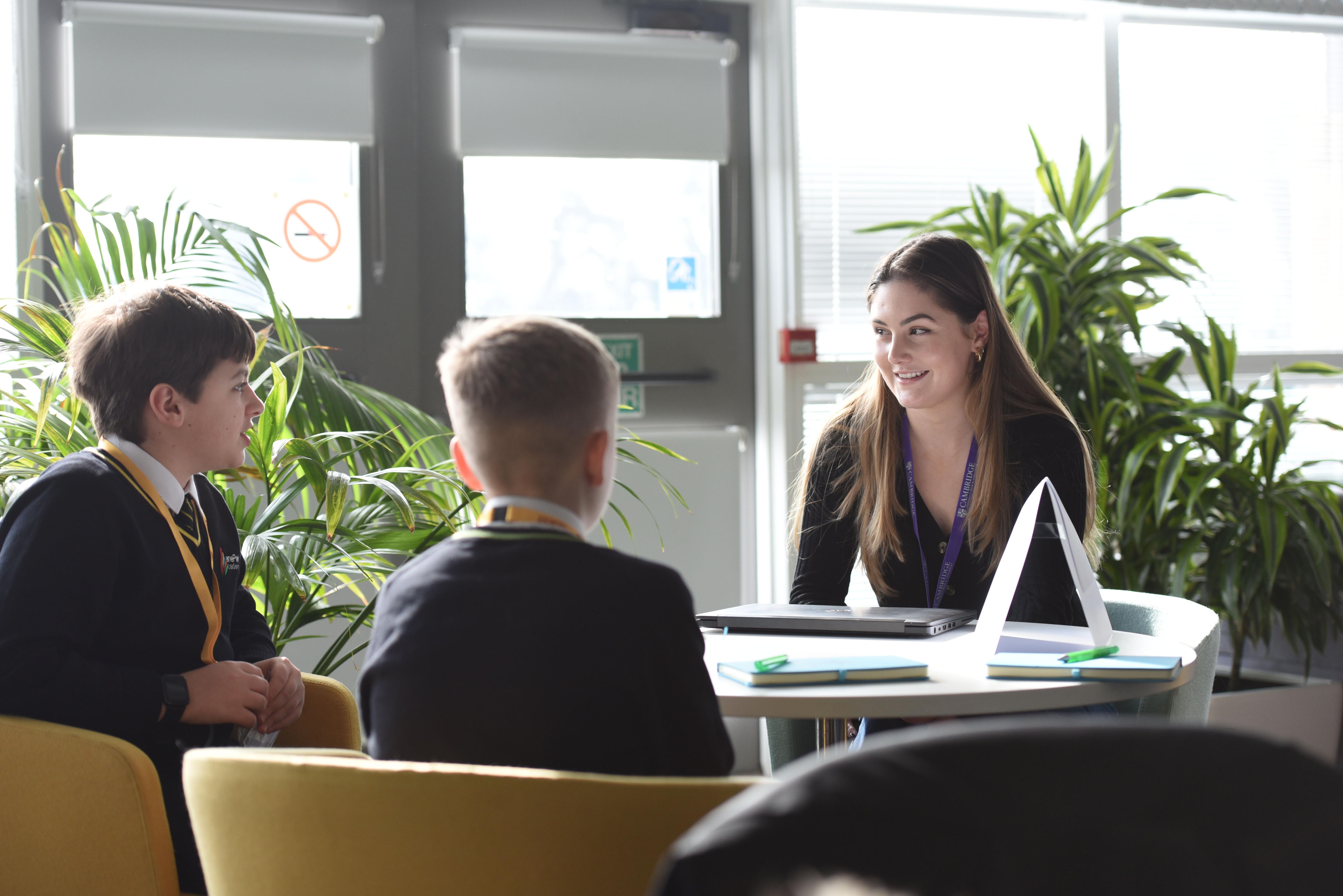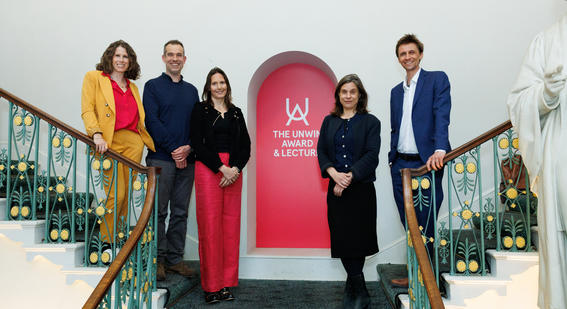Breaking down barriers for young people
Staff networks, internship schemes, and work experience are some of the ways we're working to break down the barriers young people face in the world of work and to build solidarity between generations.

This year’s United Nations International Youth Day comes with a call for solidarity between generations to combat ageism and the barriers it creates for young and old.
Here at Cambridge, we are working to foster that solidarity among our people so that we can all contribute to our mission, helping millions worldwide to unlock their potential through our publishing and education work.
Ageism affects us all
The United Nations (UN) has said the world needs to harness the potential of all generations if we are to achieve the Sustainable Development Goals (SDGs) – its blueprint for achieving a better and more sustainable future for all.
But in a report last year, the UN found ageist attitudes were widespread around the globe, affecting people’s health and quality of life and costing societies billions of dollars. Both older and younger adults were often disadvantaged in the workplace, but the report said ageism against younger people was also found across health, housing and politics, with their voices often denied or dismissed.
Fostering intergenerational solidarity in the workplace
For colleagues navigating the early stages of their career at Cambridge, we have the Young Employees Network – one of our many staff networks advocating for colleagues across the organisation as well as supporting equality, diversity, inclusion and belonging for all. This staff network aims to empower young people and early-career colleagues to take and create opportunities for success in the workplace through community, collaboration, and advocacy.
In doing so, it also fosters intergenerational solidarity by encouraging colleagues of all ages to recognise and appreciate the different experiences and perspectives they bring to our organisation.
Sarah Taylor, who works in our English language teaching team, sits on the network’s committee. She said: “Our Young Employees Network offers colleagues a supportive space to ask questions or raise concerns and to socialise with colleagues in similar situations. We host career panels and let people know about opportunities being offered by the organisation.”
When asked about her advice to those at the start of their careers, Sarah said: “You have so many exciting career opportunities as a young person, but it can be hard to find first employment. Most importantly, be open-minded about roles that will allow you to develop your skills and take interesting career steps into something you’ll enjoy.”
Getting started
Getting that first job can be hard. A YouGov survey of 11-19 year-olds in the UK, commissioned by charity Speakers for Schools, found not being able to get relevant work experience is the single biggest barrier to finding a job for young people, with 39 per cent of respondents ranking it as their top concern.
We have an important role to play in helping to break down perceptions of our industry. We encourage young people to explore the careers we have to offer, along with all groups who are underrepresented in our sector, including candidates from diverse ethnic and socio-economic backgrounds, care leavers, and people with disabilities or who are neurodiverse. We are keen to give these underrepresented communities insights into working in publishing and education.
Recently we have worked with Speakers for Schools on a series of workshops to showcase how technology is changing job roles and the skills required for the future. Colleagues working in digital and data in assessment and publishing spoke to more than 2,000 14 to 19-year-olds from 33 schools across the UK's East of England and East Midlands regions.
We have also partnered with Cambridge-based organisation, Form the Future CIC, who help young people find their route through education into employment. Together, we have held events that give Cambridgeshire secondary school students the opportunity explore our organisation and get to know us as a large, local employer.
Our head of community engagement, Heidi Mulvey, said:
Providing work experience and insights into our industry is one of the most powerful ways we can support young people in our communities. They get direct experience of the wide range of roles we have, some of which they may not know about, and it develops transferrable skills and confidence about the recruitment process.

Gaining confidence and experience through internships
Internships are another way we can give young people – and those wanting to change industry – that first experience of work, and we have been involved in several internship schemes around the world.
One of our internship partners is Creative Access, an organisation enabling people from communities under-represented in the creative industries to access careers, to progress and to reach leadership positions.
Constance Lam is working as an intern with the marketing and brand communications team in academic publishing, while she completes her master's degree in publishing. She said: “I found out about this internship through Creative Access and applied through its scheme for applicants from under-represented backgrounds.
“The past two months with Cambridge have been rewarding and productive, and I’ve learnt a lot from everyone around me. I’ve become more confident at networking and more proactive in the workplace, and I feel better equipped for the next stage of my career.”
Yemaya Marsden, a qualified teacher, is currently working as a content development assistant in our Cambridge Learning for Schools team. She said: “I have always wanted to get into publishing, but never had the connections. I found this internship on Creative Access, and I had to go for it! It has been mainly remote, which is ideal as I live in the North of England, and I’ve also had the amazing opportunity to stay in Cambridge for two weeks with three other interns.
“Over the past two months, I have not only gained a wealth of knowledge and experience within a prestigious publishing organisation, but I have also gained my confidence back. It is possible to work at a place that genuinely cares about you and values your work!”
Siyanqoba Zindela has been working with us as design and animation intern in our Cape Town office. She said: “It’s difficult to find jobs these days, so more than anything I’m grateful and relieved that I got to do what I wanted. It can be a lot of work and a bit overwhelming, but after successfully completing a task, I gain a bit more confidence in my abilities.”
Editorial intern, Nqobile Chili, has also been working in our Cape Town office. She said: “I applied because I wanted to get more knowledge about the publishing industry, and I wanted to get experience. It feels amazing and exciting to be at the early stage of my career and I think that starting by getting an opportunity to work at Cambridge University Press & Assessment has given me a solid foundation.”
Zhuohang Li (Carl) is a student at the University of Cambridge and is currently working with our Assessment Research Division over the summer. He said: “To be honest I was a bit nervous in the start, but I soon found out that every single colleague here is super supportive, welcoming, and friendly. I really enjoyed the working life at Cambridge and I really wish, if possible, to come back to this organisation after I finish this internship.”
In the UK, we have also been taking part in schemes such as the charity Leonard Cheshire’s Change 100, which matches university students and recent graduates with any disability or long-term condition to progressive employers, and the UK government's Kickstart Scheme which aims to support young people aged 16-24 into employment.
Bathsheba Brook has been working with us as an Equality, Diversity, Inclusion & Belonging Assistant, having applied for the six-month position through the Kickstart Scheme. She said: “One of the aspects of the role that I find the most enjoyable is the chance to meet so many different people. Building networks and professional connections can feel challenging at early career level, but the welcome I’ve received has really helped me gain confidence in forming and maintaining those vital relationships.”
Our approach
Supporting colleagues navigating the early stages of their career is just one part of our strategy to enable our people to pursue their potential.
Our global head of employee experience, Helen Hollebon, said: “Key to everyone’s success and growth is our culture, and our four values of responsibility, innovation, collaboration and empowerment are central to creating a productive, inclusive workplace.
“Our staff networks are an excellent way to connect with other colleagues and make this an even better place to work. To set our people up for success we’ve also invested in a wide range of professional development options, such as apprenticeships, our academies, career development networks and a learning platform with thousands of courses.”
Careers with us
No matter who you are, what you do, or where you come from, you’ll feel proud to work here.





